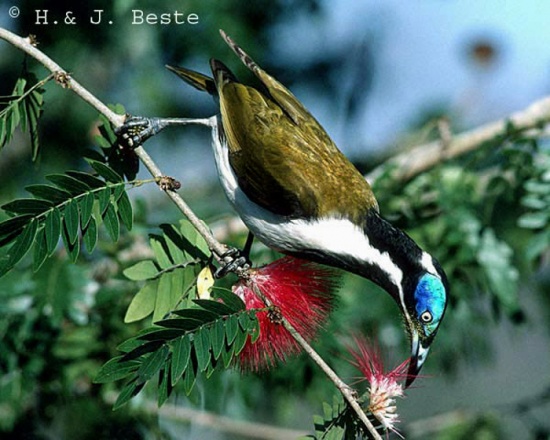Muscatclark (talk | contribs) |
|||
| Line 3: | Line 3: | ||
;[[:category:Entomyzon|Entomyzon]] cyanotis | ;[[:category:Entomyzon|Entomyzon]] cyanotis | ||
==Identification== | ==Identification== | ||
| − | 32 cm. White underparts, olive back and wings, bare blue skin around eye, blackish head and throat, white stripe round nape. '''Juvenile''' - yellow | + | '''Adult''' 32 cm. White underparts, olive back and wings, bare blue skin around eye, blackish head and throat, white stripe round nape. '''Juvenile''' -Fledgling is 'red/brown' changing to bronze then yellow maturing through green and finally blue face patch. |
| + | |||
==Distribution== | ==Distribution== | ||
Northern and eastern coasts of [[Australia]] and [[New Guinea]]. | Northern and eastern coasts of [[Australia]] and [[New Guinea]]. | ||
Revision as of 12:13, 3 February 2009
- Entomyzon cyanotis
Identification
Adult 32 cm. White underparts, olive back and wings, bare blue skin around eye, blackish head and throat, white stripe round nape. Juvenile -Fledgling is 'red/brown' changing to bronze then yellow maturing through green and finally blue face patch.
Distribution
Northern and eastern coasts of Australia and New Guinea.
Taxonomy
There are 4 subspecies.
Habitat
Open woodlands, parks, gardens and surrounding scrub.
Behaviour
The diet includes insects, pollen, fruit, (especially bananas or grapes) and nectar.
It builds a bowl shaped nest from twigs and bark; 2 buff-pink splotched with red-brown or purple eggs are laid. It is parasitised by the Asian Koel.
Vocalisation
Call: ki-owt.




